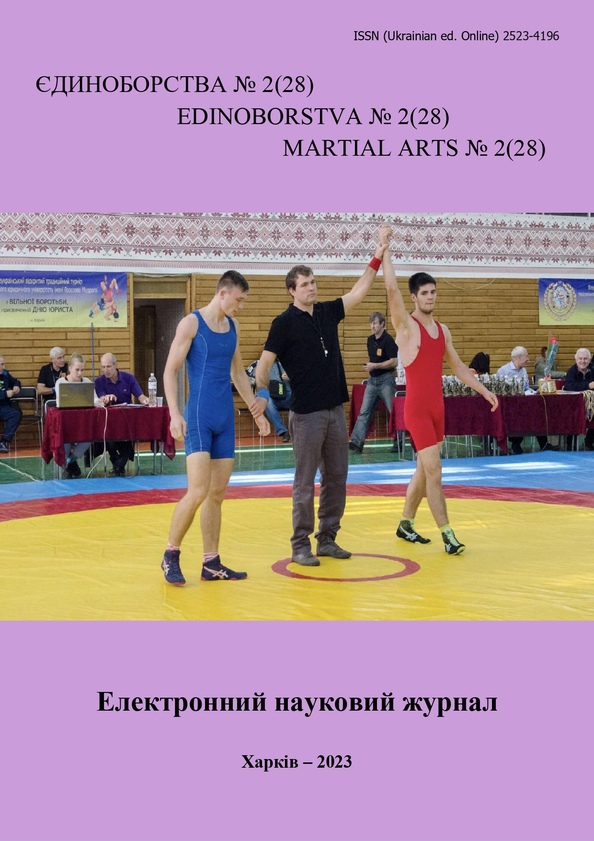Дослідження мотивації спортсменів-юніорів до тренувальних занять з карате
DOI:
https://doi.org/10.15391/ed.2023-2.05Ключові слова:
анкета, мотивація, тренування, карате, юніор, дослідженняАнотація
Мета: визначити рівень мотивації каратистів-юніорів до тренувальних занять. Матеріал та методи. У науковому дослідженні приймали участь каратисти-юніори 14,6±2,59 років зі спортивних клубів м. Харкова та інших міст України в кількості 31 спортсмен. На підставі вивчення науково-методичної літератури, бесід з тренерами, педагогічних спостережень складена анкета щодо виявлення причин (ситуацій, обставин), які побудили та побуджають спортсмена відвідувати тренувальні заняття з карате. Для проведення дистанційного анкетування було використано програмне забезпечення «Google-Form». Результати: дослідження показало, що 45 % опитуваних дізнались про карате від батьків, у 32 % спортсменів займаються друзі, 20 % до секції карате потрапили завдяки оголошенню в школі, 3 % потрапили на змагання з карате. У 77 % респондентів займаються карате батьки, брати та сестри, родичі. На питання про особисті якості свого тренера 47 % респондентів обрали розумний, справедливий, 33 % - веселий та добрий, 20 % - строгий та вимогливий. Щодо питання «ідеальний тренер» 25 % респондентів відповіли, що їх тренер саме такий. У 52 % спортсменів спортивна зала знаходиться на відстані 1-3 км; 23 % - менше 1 км; 19 % - 5-10 км та більше ніж 10 км – 6 % спортсменів. Пішки йдуть на тренування 71 % спортсменів, 16 % привозять на машині, 10 % користуються міським транспортом та 3 % користуються послугами таксі. Час на дорогу до спортивної зали у 55 % спортсменів займає 10-30 хв, у 26 % - 1-10 хв, 16 % - 30-60 хв та більше 1 години витрачають на дорогу 3 % каратистів. Інтерес до самих тренувань залежить від того, чи виконують спортсмени на тренуваннях улюблені вправи. Більшість спортсменів (24 із 31) полюбляють відпрацьовувати елементи «куміте» (вільний двобій), також ті ж 23 із 31 спортсменів полюбляють вчити та виконувати ката. 19 із 31 подобається виконувати «кіхон» (базову техніку) та по 16 відповідей за рухливі ігри та вільний двобій. Похвалу від тренерів 71 % спортсменів чують декілька разів на тиждень. 26 % спортсменів чують похвалу на кожному тренуванні, та 3 % каратистів відповіли, що їх тренер не звертає на нього уваги. 97 % каратистів підтримують зв’язок поза залом в месенджерах, комп’ютерних іграх, на прогулянках; більшість (68 %) каратистів мають в своїх групах спортсменів з яких хочеться брати приклад. 58 % спортсменів вказали, що їх тренери роблять сумісні зустрічі поза залом. Одна з важливих відповідей: 65 % каратистів хочуть стати тренерами в майбутньому. Висновки. На підставі проведеного дослідження більшість спортсменів починають відвідувати заняття з карате за рекомендацією батьків та друзів. Одним з головних чинників до відвідувань тренувальних занять є невелика відстань до спортивного залу. Більшість опитуваних бажають у майбутньому стати тренерами, що є дуже важливою складовою для подальшого розвитку карате в Україні.
Посилання
Алексєєв, А.Ф., Ананченко, К.В., & Голоха, В.Л. (2021). Мотивація та психоемоційний стан в змагальній діяльності дзюдоїстів-ветеранів. Єдиноборства, 4-12.
Ашанин, В.С., & Литвиненко, А.Н. (2011). Индивидуализация технической подготовки квалифицированных каратистов. Педагогіка, психологія, та мед.-біол. пробл. фіз. виховання і спорту, № 5, 81–84.
Біліченко, О.О. (2011). Особливості мотивації до занять з фізичного виховання у студентів. Педагогіка, психологія та медико-біологічні проблеми фізичного виховання і спорту, № 5, 3.
Бойко, О.О. (2013). Теоретичні аспекти впливу мотиваційних складових на підвищення ефективності занять із фізичної культури. Фізичне виховання, спорт і культура здоров’я у сучасному суспільстві, № 1 (21), 94–98.
Горбенко, О.В. (2009). Мотивація і її роль у розвитку особистості студентів, що займаються східними єдиноборствами. Збірка наукових праць ХДАФК, №1, 181–183.
Горшкова, НБ. (2005). Мотивація школярів до занять фізичною культурою і спортом. Актуальні проблеми фізичної культури і спорту, № 6–7, 130–133.
Занюк, С.С. (2002). Психологія мотивації. Навчальний посібник. Либідь, Київ.
Клименко, В.В. (2006). Психологія спорту. Навчальний посібник для студентів вищих навчальних закладів. МАУП, Київ.
Клименко, В.В. (2007). Психологія спорту. Академія, Київ.
Ковальчук, О.П., & Панайотов, І.Р. (2019). Особливості та основні завдання етапу спеціалізованої базової підготовки в спортивних єдиноборствах. Гуманітарний простір науки Переяслав-Хмельницький, Nо 22, 20.
Ложкин, Г.В. (2011). Психология спорта: схемы, комментарии, практикум. Учебное пособие. Киев.
Михайленко, С.В., & Павловський О.А. (2015). Формування мотивації у дітей та підлітків шкільного віку до тренування кіокушин карате. Актуальні проблеми розвитку традиційних і східних єдиноборств, 261.
Переверзеева, С., Андрианов, Т., Дронникова, Т., & Дронникова, Е. (2012). Определение факторов мотивации старшекласников к занятиям физической культурой и спортом. Фізичне виховання, спорт і культура здоров’я у сучасному суспільстві, № 2 (18), 188–191.
Пристинський, В.М. Курисько, Н.О., Пристинська, Т.М., & Григоренко, О.І. (2008). Взаємозв’язок пізнавальної активності та розвитку мотивації до занять фізичною культурою в навчально-виховному процесі загальноосвітніх шкіл. Педагогіка, психологія та медико-біологічні проблеми фізичного виховання і спорту, № 6, 59–63.
Пруднікова, М.С. (2019). Мотивація до занять спортом на початкових етапах тренування Основи побудови тренувального процесу в циклічних та екстремальних видах спорту. Збірник наукових праць ХДАФК, 3, 205-208.
Трофімов, Ю.Л. (1999). Психологія. підручник для студентів вищих закладів освіти. Либідь.
Федоскіна, Е.М. (2010). Методи психологічної реабілітації спортсмена, що знаходяться в стані перенапруження. Рудиковские чтения, 153-155.
Худик, В.А. (1992). Психологическая диагностика мотивации. Методы исследования. Освіта, Київ.
Шаболтас, А.В. (2004). Мотиви занять спортом. Олімпійська література, Київ.
Шевчук, О.В. (2021). Психологічні особливості мотивації спортивних досягнень вихованців секцій бойових мистецтв. Кваліфікаційна робота. Київ.











